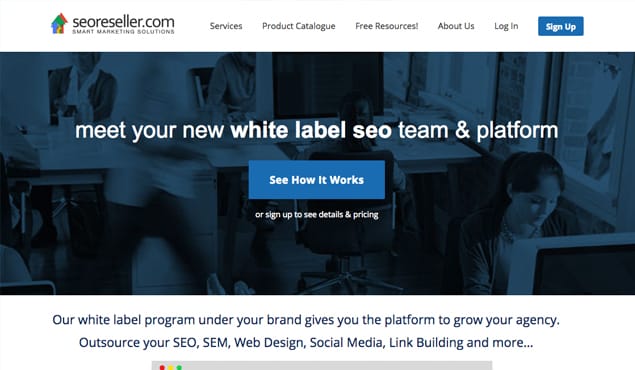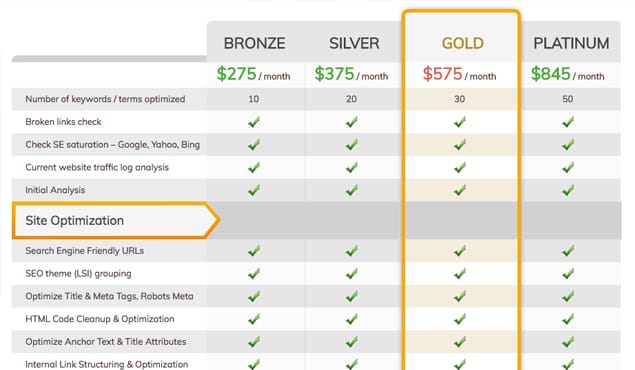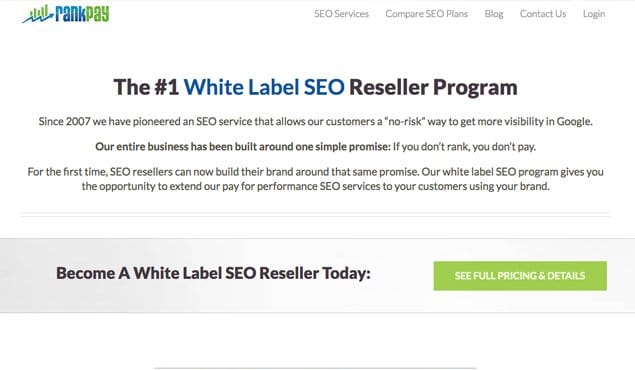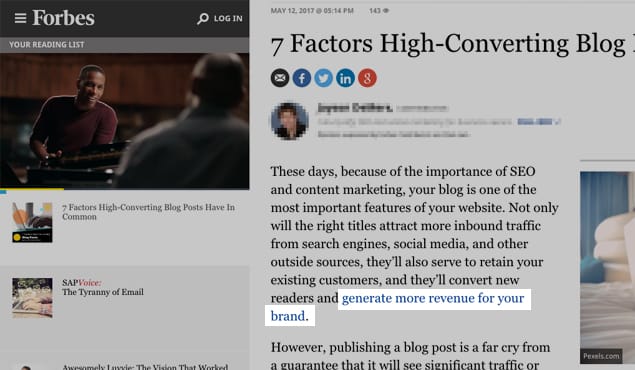There’s always a strong temptation to outsource elements of your business that you might not quite grasp yourself. Why spend the time and money learning and experimenting when there are professionals out there willing to do it for you, for a price?
The problem, of course, is that SEO is a very personalized institution. The general tips and guidelines are the same from site to site, but exactly how you implement it is something you really need to understand. Outsourcing SEO is the kind of thing where a company will apply a template of actions, which can work, but can also take your site off in the wrong direction. It’s too impersonal.
Examples of SEO Resellers
I’m not going to make a big list of SEO resellers and recommend that you use them. Rather, the list is here to show you what I mean when I talk about SEO resellers, rather than a dedicated marketing agency or a freelancer who works with your brand. Three such examples are Outsource SEO, SEO Reseller, and RankPay.
These companies tend to work in the same way; they essentially embark on a guest post campaign through sites in their list of connections. They create content and send it all over the web, building links to your site, which is designed to get your site to rank more highly in Google search results. It’s sometimes effective, but there are a lot of possible drawbacks.
The primary drawback is the same one I mentioned in the intro; it’s impersonal. These companies have writers either on staff or through contracts that create content for whatever brands come their way. This means the writers are generalists, not specialists. They don’t know all of the intricacies of your industry or the public perception of your brand. They don’t know your voice or the kind of impression you want to convey. They simply know general ideas of what they should write, and they write it as fodder for a link.
Is the post they create something you would be proud to publish or have your name attached to? Probably not. Much of the content ends up being generic or surface-level analysis, or even just cribbed off of another post somewhere on the web. It’s not the kind of flagship content you want circulating with regards to your brand.
Another drawback is the locations these posts are published on. You’ll see domains come up in your analytics referral data that you’ve never seen before, and with good reason; often these sites use private blog networks for their links. Oh, they make the sites look as natural as possible, but when your link appears on 10 different blogs around the same time, and someone else’s link appears on those same ten blogs, and over and over, it’s easy to trace. Google can trace it and devalue those links, and then where are you? You paid for SEO service, and sure, you got it for a while, but then the value disappears.
You’re not getting authority site placement, you’re getting the bottom of the barrel. If a site is a member of a private blog network, then it’s probably not a great site. It could just be a struggling blogger willing to sell space on their site, or it could be some mid-range site that just doesn’t quite fit your niche. In the worst case scenario, it could even be a network of spam sites, and that can really come back to hurt you.
Even if you’re getting placement on non-PBN, minorly popular sites, you’re still spending a lot to get that link, that traffic, that ranking. A better ranking makes your traffic and conversions go up, but at the same time, it’s an investment you didn’t have before. Chances are pretty good that you’re spending more than you’re gaining.
Maybe, if the SEO value was lasting even after your contract with the SEO reseller ends, you could come out ahead. Or maybe you’ll just be in the hole and need to dig yourself back out. There’s no way to tell what you’re going to get before you spend a bunch of money to get it.
There’s always a better way. Now, obviously the best way to accomplish SEO growth via off-site SEO is to do it yourself. If you can reach out to site owners, if you can create excellent content, you can get a lot of value for virtually no investment.
The middle of the road option is to work with freelancers, contractors, and authors for larger websites. You always read about how networking is more important than a resume in a job search; it’s the same way with everything else. If you can make friends with the editor of Forbes, you’re pretty likely to be able to get a post published. If you can make friends with an author on Entrepreneur, you can get them to slide a link to your site into one of their posts, and you don’t even have to pay them.
Where Agencies Enter the Picture
Most of the above seems directed at sites that are looking to hire out their marketing, but what if you’re the agency that does the marketing? You might want to form a sort of middleman arrangement. If people come to you to get their site to rank, but you don’t want to do the work directly, you can buy the SEO services in turn. All you do is crank up the prices and refer traffic through to your actual service providers.
This is in part what the SEO resellers do, that I listed above. They’ll work with individual clients, but they’ll also work with agencies that will resell their services. In particular, the link to RankPay is to their reseller platform, not just to their SEO services, so you can see what they’re offering.
There are problems with founding your business in a middleman position. For one thing, if your customers do a little detective work, they can figure out where their services are actually coming from. They can then cut you out and just go to RankPay directly, and then you’re out a revenue stream.
Since your business model and your profits rely on taking the price from the seller and increasing it for your own cut, you’re susceptible to price changes from the seller. If RankPay is charging $100 a month for an SEO service and you’re charging your clients $110, you make $10 per month per client. If RankPay or whoever decides to increase their price o $105, suddenly your revenue is cut in half. You have to decide; do you take the pay cut, or do you increase prices for your clients? Increasing prices can be dangerous, because some of them can leave entirely, and that hurts even more.
A Better Way
As an agency or a reseller middleman, you can go about things differently and make yourself more of a formidable and resilient company. What you need to do is establish relationships with a network of people in different positions that can benefit you. They fall into a few different categories.
1: Content creators. These are the people that will actually create the content for your marketing services. Rather than going to a content mill or hiring on generalist “will write anything” writers, you want to find specialized content creators for various industries. The more familiar they are with the industry, the better quality the content they produce will be. People will be impress with the quality you provide and will be more likely to order more when they see it.
Granted, this can be limiting when you’re starting out. You might not have a reputation, so the best writers might not want to work with you. You might only have good writers for a couple of industries, so clients from other industries are more likely to turn away. However, sometimes you can simply specialize and broaden your services later. If you start out as the marketer’s marketer, you can broaden into financial, health, beauty, and other niches down the line.
2: Sources of bulk links. These are blog owners and connections to people who can get your links to your clients on sites that, frankly, aren’t that great. You don’t want to go the private blog network route, even if it’s tempting, because you will be found out and you will have a lot of angry clients when Google smacks them down. You also don’t want to go the spam route, for obvious reasons. Instead, look for sites that aren’t all that high profile, but can still provide a good link here and there, in various niches. These people might want to boost their revenue with sponsored posts, but are going to be cheaper than the top end of the best sites.
3: Sources of high profile links. These are your connections with the high end sites. The Forbes editor, the Entrepreneur writer, these are people who can get you the foot in the door for the highly valuable links that do the most obvious good for your clients. However, these people will either be harder to reach, will be much less likely to actually want to publish such a link, or will be quite expensive to buy those link spaces. You’re going to want to spend a lot of time building these connections, so you have enough that you don’t have to lean on any one person too often. Spread your links around and don’t try to force every client through the same channels.
4: Assistance and tools. These are the people – who I am not calling tools, thank you – who can help you in other aspects of your reselling. These are the graphic designers, the data analysis specialists, and other people who can help you refine your process or simply provide an additional service you need beyond content and contacts.
Once you compile a large stable of people in each of these categories, you’re in a much better position to move forward. This gives you a lot of potential benefits.
For one thing, you can establish pricing with each freelancer individually, which allows you more flexibility. Some will accept lower than industry-standard pricing for their services. Some of them will demand more, but will be valuable enough that you’re willing to pay, using the surplus from the people who charge less. If one demands more, you can increase what you pay them without needing to increase pay across the board. You’re much more resilient to various price changes in the industry. If you need to decrease pricing and have less income to work with, you can just dial back on the volume you send to the high priced freelancers and work with the cheaper ones a little more.
Another great benefit is the relationships you build. Not only will you have lasting connections with a wide variety of people, but you can follow those people as they move. A client might grow beyond the need for your services, but they might be able to turn around and sell link space to you, allowing you to keep that relationship alive on mutually beneficial terms. They are a success story that continues to benefit you beyond a testimonial.
The fact is, if you’re trying to resell the kinds of SEO companies that come up on a simple Google search, you’re setting yourself up to fail. These companies are going to charge too much for you to have high profit margins, and they’re likely going to provide your clients sub-par services to maximize their own profits. You’re subject to their whims, and if you lose their contract for some reason, your entire business can collapse. Meanwhile, if you build your empire for yourself, it’s going to take more work but it’s going to be far more resilient. If a freelancer leaves, so what? You have 30 more.
Hard work pays off, in this and every other industry.
 ContentPowered.com
ContentPowered.com








